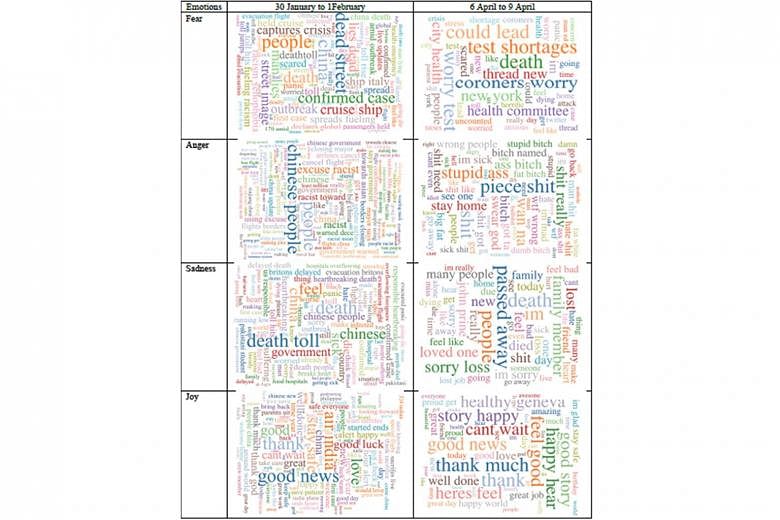The feelings of people around the world about Covid-19 have shifted from fear to anger and joy as the pandemic developed, according to a study led by Nanyang Technological University (NTU) that analysed 20 million tweets on Twitter from January to April.
The team's findings released yesterday showed that fear was the dominant emotion from late January to early March, accounting for up to half of daily tweets analysed.
But that began to decline as anger spiked in late February, peaking at 29 per cent of tweets on March 12, a day after the World Health Organisation declared the Covid-19 outbreak a pandemic, while the feeling of joy began to climb slowly from late March to early April.
The study, a collaboration with overseas universities, analysed tweets in English that made reference to the coronavirus.
A machine-learning algorithm called CrystalFeel, developed by the Agency for Science, Technology and Research, was used to identify joy, sadness, fear and anger based on words or phrases.
For example, words such as "scared" or "panic" could have appeared alongside Covid-19-related terms such as "confirmed case".
These point to fears over the initial unknowns surrounding the coronavirus and later, the shortage of Covid-19 tests, the team said.
On the other hand, xenophobia was a common theme among anger-related tweets at the start of the pandemic when China was the epicentre of the outbreak, with "Chinese people" being one of the most common phrases found.
But the anger subsequently evolved in April, the team said, with "stay home" and a variety of swear words becoming more common in tweets, reflecting negative feelings associated with isolation.
The study also found an uptick in sentiments of joy relating to national pride and community spirit as time went on, which researchers said offered a "glimmer of hope".
"Our findings suggest that collective issues driven by emotions, such as shared experiences of distress (during) the Covid-19 pandemic... are developing," said team leader May O. Lwin, who chairs NTU's Wee Kim Wee School of Communication and Information.
She said widespread mistrust and a belief in online falsehoods could hinder the ongoing control of the disease, should such emotions not be addressed through clear and decisive communication by governments, citizen groups and social media stakeholders. Professor Lwin intends to conduct follow-up studies to examine country-specific trends in public emotions.
Preliminary findings indicate there has been a moderate balance of positive sentiments in Singapore, relating to resilience, civic pride and celebration of acts of kindness. This is in contrast to other countries where strong negative emotions overwhelmingly feature in social media posts.



